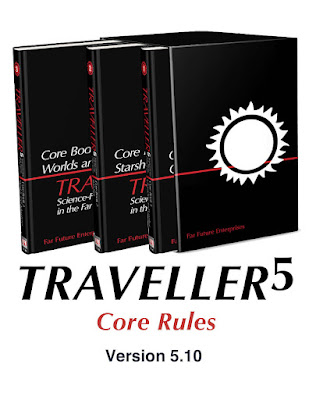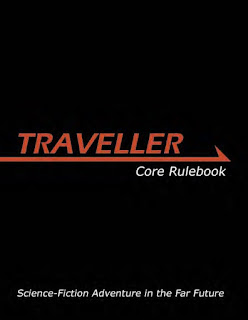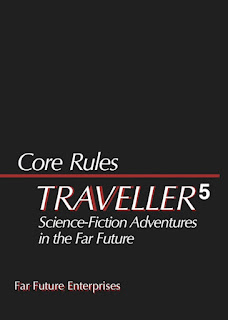I have the Traveller 5.09 version I grabbed from Far Future Enterprises and the 5.10 version from DriveThruRPG. For the purposes of this review, I am going to be considering the 5.10 version.
T5 Traveller5 Core Rules 3-Book Set
As with Classic Traveller, this version is split up into three books. They are not little, and the covers are not included, but they do have the same names. So that is fine.
Each book has a comprehensive table of contents of all three books.
Book 1: Characters and Combat
PDF. 208 pages, black & white and color interior art.
Starting out this has a different feel than other versions. We start with the the typical "What is a Roleplaying Game" bits and "What is Traveller" under the Traveller is a Role-Playing Game section with an example of play. What follows is a bit on the Galaxy (weird to see how little of it is charted in Traveller), A Brief History of the Universe, and The Foundations of the Universe. The feel here is one of situating the characters in the Traveller Universe first as opposed to having the character operating in the universe as Classic Traveller does. Thematically (not rule-wise) this makes it a bit closer to MegaTraveller.
Traveller Uses Dice takes us back to the real world. There seems to be some new dice mechanics being introduced here in the form of "Flux Rolls." We get bits on Money, Ranges, and Humanity. I have to admit I admit I am not liking the organization so far. The topics seem to come at random.
Ok. We finally get to a chapter Characters are the Central Focus of Traveller, but not till page 46.
Characters still have the same six basic characteristics/abilities but there are an additional two added, Psions (Psi) and Sanity. Then there are another eight that are also used that are combinations of the regular six. I can't help but feel that something that was elegant is not needlessly complicated.
Eleven pages later we get to Characters and Careers. This covers the careers that we see in many versions of Traveller. I do like the art on the various medals a character can get while in the service, nice touch. The careers are comparable to previous versions. Each carrier gets a single page of detail which is nice really, print it out and staple it to your character sheet card. There are also many tables for backgrounds.
There is a new section on Genetics. There are some lists and diagrams for family trees (genetic trees) but I am not seeing the in-game application to this yet. I guess if your character is genetically modified this would be good. Sections on Chimeras, Synthetic Lifeforms, and Clones follow.
Tasks are next and deal with how you do things in Traveller. We are back to a Roll Under task resolution. A few pages discussing how tasks are determined with an example of three character with low, medium and high dexterity.
Skills is introduced with a Master Skill list, though "Massive Skill List" would also be appropriate. There are a lot of skills here. Skills and their descriptions take up the next 40 pages.
Equipment is given the acronym QREBS for Quality, Reliability, Ease, Bulk/Burden, and Safety.
We jump back to character focus with Intuitions, Personals, and The Senses.
We get to the second half of the title 2/3 of the way into the book. Combat. Up first is Personal Combat. This covers all sorts of types of combat, conditions, environment, movement, and more. There is even an example of combat between two groups of five combatants. This is good, because I still have no real good notion of how combat works in this system. This follows by a list of weapons.
Dice is next and covers all the rolls for 1D to 10D and the Flux die. Look I have a Master's degree in Stats, I like math, I like numbers. But this feels needlessly complicated to me.
The book ends in an Index (but hyperlinks and the PDF is not bookmarked).
Book 2: Starships
PDF. 304 pages, black & white and color interior art.
One of the things I love about Traveller has been their starship-building rules. It's like character building and I don't feel bad about min-maxing or even meta-gaming it.
We start out with the basic anatomy of a stellar hex grid. Ok, that is useful. This introduced us to the section on Star Systems. We get some brief overviews of systems and some helpful charts and tables to describe them. This is followed by Star Ports (places to go in the system) where the adventures usually begin.
Starships are next and cover all sorts of starships. The same sorts of details are here as in other versions of Traveller. I would need the rules side by side to see the differences, but it feels more like Traveller T4 than anything. Lots of color art for the various types of ships are a nice touch. Our old friend the Beowulf-class Free Trader is present.
Starship Design and Construction covers how to build and pay for these ships. All of this is recorded on the Ship Card, like a character sheet for ships. This is a feature that goes back to the beginning.
Maneuvering is next, or how your ship is a ship and not a space station. This includes interplanetary travel. Jump covers interstellar travel.
Plenty of sections on how Power, Sensors, Weapons, Defenses, Fuel, and Space Combat work. Far more detail than I recall in any version of Traveller so far.
Trade and Commerce Between the Stars section is next. Traveller is built on the reality that goods and people need to move between the starts and there is an economy based on that.
Technology and Tech Levels are discussed in detail. Followed by Lifespans of intelligent species (why wasn't this in Book 1?), Interstellar Communities, Computers, and Robots.
This book was a bit better organized than Book 1, up till the end that is.
Book 3: Worlds and Adventures
PDF. 304 pages, black & white and color interior art.
This covers Worlds and Systems. It seems that some of the System material from Book2 would have been better here.
If Book 1 creates characters, and Book 2 creates Starships, then Book 3 creates worlds and systems. Again pretty detailed with charts and graphs galore. This covers the first 94 pages or so.
Makers or building things run the next 80 odd pages. Seems like this should have been in book 2.
Special Circumstances are next for the next 70 pages. This includes Psionics. This covers psionic characters and their powers. This also covers the Zhodani.
There is an interesting sub-section on Sophonts, or intelligent non-humans. Again, this would have been better served in Book 1 I think, but I do see why it is here.
We don't get to Adventuring until page 270 and then it is only 10 pages. Very underserved in my mind.
Each book ends with book specific Appendicies and Indexes.
--
So. 816 pages of PDF rules for Traveller 5.10. (FYI my Traveller 5.09 weighs in at 760 pages).
What do I know? Well. This version of Traveller is an interesting view of divergent evolution. In 2015 to 2019 (and still) there are two in print, live versions of Traveller out there. Traveller 5 and Mongoose Traveller. Both have the same ancestor, Classic Traveller, but each went on a different path.
We also live in a world now where ALL versions of Traveller are easily available in PDF, Print, and POD versions.
Given all of this, I just can't see myself playing Traveller 5. There is a LOT here I can see myself using though. I do not regret buying it at all. Far from it. I think my goal here is to grab anything I can find that is useful that is still roughly compatible with the Classic Traveller Core.
My issues with Traveller 5 are largely from the organization of the material and the over-complication of the rules. I am not a fan of roll-under systems, but I can get over that for the right game.
I give Far Future Enterprises credit for trying to expand the game in a new direction, it's just a direction I am interested in going in these days. At nearly $45 for three (four if you count the "Read me" pdf, which I don't) PDFs and no POD option is a bit rich for most people's blood.
Still, I am a perpetual sucker for the sunk cost fallacy, so I am always looking for an excuse to use all my books.
BTW: This is also my 5,000th post here at the Other Side!





4 comments:
This was physically printed at some point, right? I seem to recall flipping through it at the local store and putting it back on the shelf.
Congrats on the 5000th post. That's a lot - I think adding all three of my somewhat dusty blogs together would reach a fifth of that.
I've really enjoyed these reviews
I really wanted to like this edition, but I backed the first Kickstarter for over $100 and the resulting printed doorstop left a bad taste in my mouth. I'm still not sure how to build a starship in it. If PDFs were more convenient I might be able to use my copy of 5.10, but for me electronic documents are better suited to shorter subjects.
That said, there are things I like about it, such as the expanded info on Tech Levels, the idea of QREBS. Um. Probably some other things I'm not thinking of right now. But I don't see any real reason to give up CT, MT, or GT. For that matter, TNE has the advantage of sharing a system with Dark Conspiracy* and Twilight 2000 V.2.2. I can incorporate the parts of T5 that I like into those pretty easily.
*Or, rather, it is easy to use the TNE/V.2.2 system with DC, since all of the equiment, character, and other stats are identical, just processed through the system slightly differently.
technically published 2013 as a single humongous black book and then reimplemented in 2015 as the 3 book set.
Post a Comment